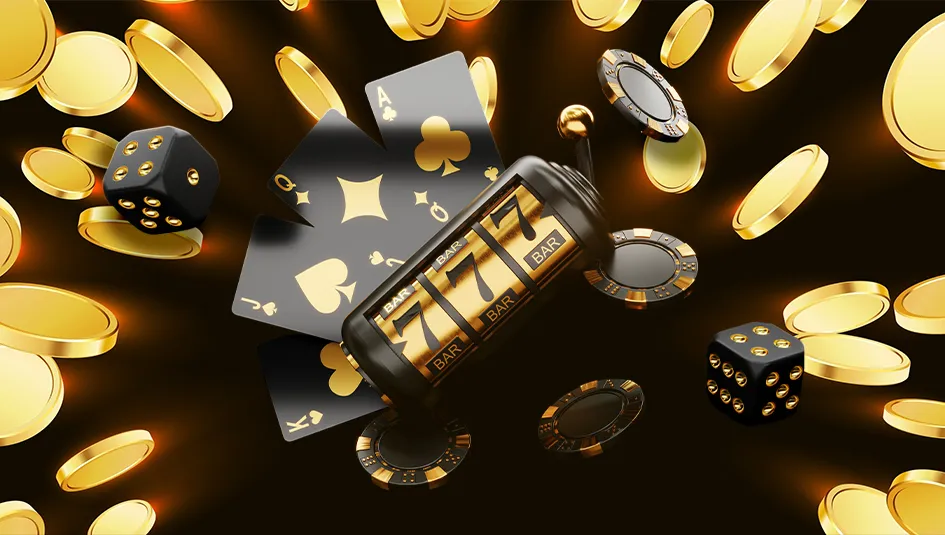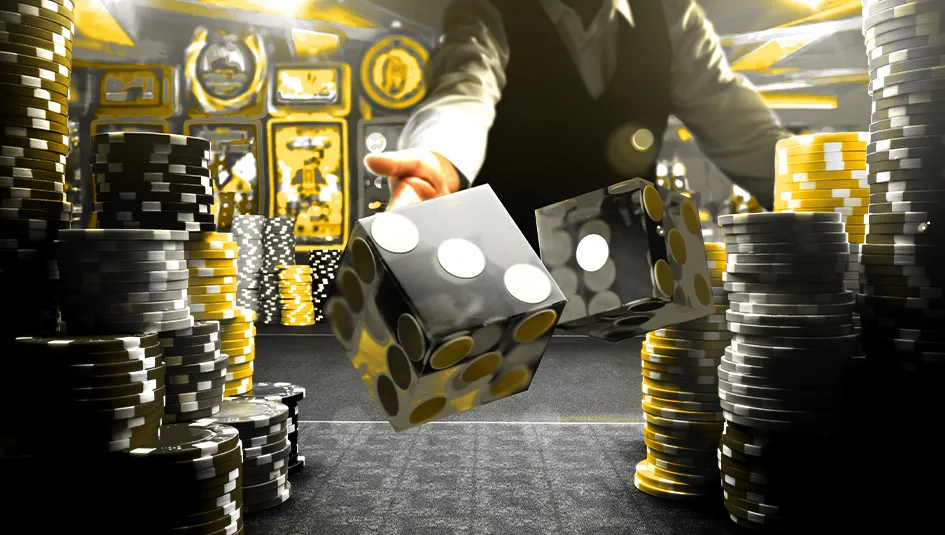Key Mathematical Concepts in Casino Gaming
Casino gaming intertwines with diverse mathematical concepts, which, when comprehended, can improve the player's strategic approach:
- Probability: Governs every game outcome.
- Combinatorial Analysis: Used to calculate potential outcomes, crucial in games like poker.
- Stochastic Processes & Markov Chains: Aid in predicting the likelihood of future events in games like blackjack.
- Risk of Ruin: Helps in bankroll management and determining optimal bet sizes.
- RTP (Return to Player): Essential in slots for maximizing long-term winnings.
- Independent Events: Key to understanding games like roulette and slots.
- Law of Large Numbers: Validates probability-based strategies over numerous games.
- Game Theory: Aids in player vs. player games for optimal decision-making.
By understanding these concepts, players can significantly enhance their strategies and potential winnings.
Game-specific Mathematical Models
Roulette
Roulette, a classic casino game, operates on straightforward mathematics. European roulette, with 37 slots (1-36 and a single zero), offers a 1/37 probability (~0.027) of the ball landing on a specific number. Players can increase their winning chances by betting on groups of numbers or colors, which, while offering lower payouts, yield more frequent wins.
Blackjack
Blackjack is a casino game where player decisions significantly affect the outcomes. Adhering to a sound strategy that considers the probabilities of drawing specific cards can minimize the house edge, sometimes to as low as 0.5%, enhancing the player's winning prospects.
Slot Machines
Slot machines are driven by Random Number Generators (RNGs), ensuring each spin's independence. The odds vary between machines, but selecting ones with higher Return to Player (RTP) percentages can enhance a player's winnings over time.
Craps
Craps is a dice game where various bets offer different odds. For instance, 'Don't Pass/Don't Come' bets have a relatively low house edge of around 1.36%, presenting an attractive option for players seeking to maximize their chances of winning.
Baccarat
Baccarat's allure lies in its simplicity and favorable odds. Placing bets on the banker leverages a low house edge of about 1.06%, offering a strategic advantage to the player.
Leveraging Variance in Gaming Strategy
Variance, a statistical measure of data dispersion, plays a crucial role in shaping a player's casino experience. High variance games, like slots, offer large but infrequent payouts, while low variance games, like blackjack, provide smaller but more consistent wins. By selecting games that align with their risk tolerance and betting strategy, players can enhance their gaming experience and potentially increase their winnings.
Advancing Your Play with Game Theory
Game theory is a powerful tool in games of skill, such as poker and blackjack. Concepts like the Nash Equilibrium can help calculate optimal strategies, assuming perfect play. In poker, for instance, strategies involve bluffing, reading opponents, and varying bet sizes—actions that can be mathematically analyzed to maximize the player's expected value.
Utilizing Statistical Expectation for Profit
Statistical expectation, or the average amount a player can expect to win or lose per bet, can be a key factor in guiding betting decisions. By understanding the expected value of each game, players can make informed decisions on where and how much to bet, potentially optimizing their winnings.
Navigating Game Volatility with Standard Deviation
Understanding the standard deviation, a measure of result variability, can provide valuable insights into the volatility of a particular game. Games with high standard deviation involve higher risk but also higher potential payouts. By taking this measure into account, players can better manage their risk and tailor their betting strategies.
Enhancing Strategies with the Monte Carlo Method
The Monte Carlo method is a statistical technique that allows for the numerical estimation of complex problems. By running a large number of simulations, it can provide estimations of likely outcomes, helping players refine their strategies in games like poker or blackjack.
Maximizing Returns with the Kelly Criterion
The Kelly Criterion is a mathematical formula that helps determine the optimal size of a series of bets. By applying this principle, players can strategically decide the best amount to wager, given their winning probability and the game's odds, to maximize potential returns.
The Role of Poisson Distribution in Casino Games
The Poisson Distribution, a statistical method, can model the number of times an event happens within a specific timeframe. This could, for instance, calculate the probability of receiving a specific number of 'blackjack' hands in a given number of rounds. Understanding such models can enhance strategic decision-making in various casino games.
Harnessing the Power of Combinatorial Analysis
Combinatorial analysis is a mathematical method used to determine the number of possible outcomes in a game. In poker, for example, the number of possible hands can be precisely calculated. This understanding can be pivotal when formulating a winning strategy. For example, in Texas Hold'em, knowing that there are 1,326 possible two-card starting hands can help a player determine their pre-flop strategy.
Stochastic Processes and Markov Chains: Predicting Future Events
Stochastic processes play an integral role in games like blackjack, where past events influence future ones. Specifically, Markov Chains, mathematical models that describe sequences of events where the probability of each event depends only on the state from the preceding event, can be applied. Understanding how this principle works can help players predict the likelihood of certain cards being dealt, potentially influencing their betting strategy.
Understanding Risk of Ruin in Casino Games
Risk of Ruin is a concept in gambling and finance that expresses the probability of losing all one's bankroll, or more specifically, reducing the bankroll to a point where it cannot recover. By understanding the Risk of Ruin and applying it to their bankroll management strategy, players can ensure their play remains sustainable and avoid catastrophic losses. This mathematical approach helps players determine optimal bet sizes to minimize the chance of ruin.
The Importance of RTP in Slots
The Return to Player (RTP) percentage is a crucial measure to understand when playing slots. The RTP is the estimated percentage of wagered money that a slot machine will pay back to players over time. By choosing games with a higher RTP, players can maximize their long-term winnings. Understanding and applying the concept of RTP can provide an important strategic edge.
Applying the Concept of Independent Events
Casino games like roulette and slots are built around independent events, meaning that the outcome of one spin or round doesn't influence the next. Recognizing and accepting this fact can help players avoid common gambler's fallacies, such as the belief that after a series of losses, a win is due. By fully understanding the nature of independent events, players can maintain a logical and disciplined approach to their betting.
These added sections further reinforce the notion that a strong grasp of mathematical principles can significantly enhance a player's casino strategy, ultimately improving their overall gaming experience and potential profitability.
The Law of Large Numbers: A Player's Ally
The Law of Large Numbers is a fundamental principle in probability theory that states that as the number of trials or observations increases, the actual result tends to get closer to the expected result. For players, this can be especially important when implementing strategies that rely on probabilities. For instance, in a game of blackjack, a player's decision to 'hit' or 'stand' often depends on the probabilities of various outcomes. Over a large number of games, these probabilities will hold true, validating and rewarding a strategy based on them.
Applying Game Theory in Player vs. Player Scenarios
Game Theory, particularly the concept of Nash Equilibrium, can be used to calculate the optimal strategy in games that involve strategic interaction with other players, like poker. Nash Equilibrium is a state in a game where no player can benefit from changing their strategy, considering the other players keep their strategies unchanged. By understanding the fundamental principles of game theory, players can anticipate opponents' moves and make optimal decisions, thereby potentially increasing their winning chances in such games.
Mastering the Game with Mathematics
Casino games offer fascinating applications of various mathematical principles. By understanding and applying these, players can optimize their strategies, enhancing not just the thrill of the game but also the joy of winning. Mathematics becomes a vital tool in the hands of the informed player, transforming casino gaming from a game of chance to a game of skill.

 Unusual Casino Games from Around the World
Unusual Casino Games from Around the World Pros and Cons of Online Casinos vs Land Casinos
Pros and Cons of Online Casinos vs Land Casinos